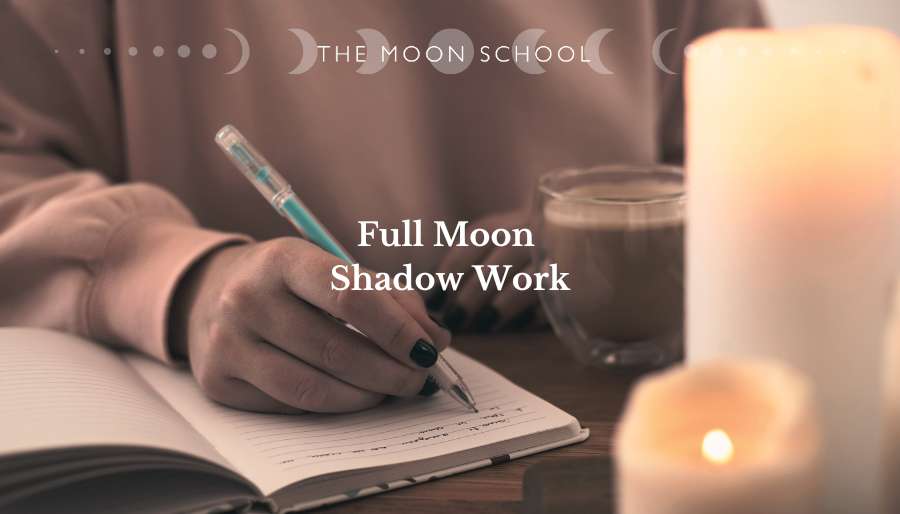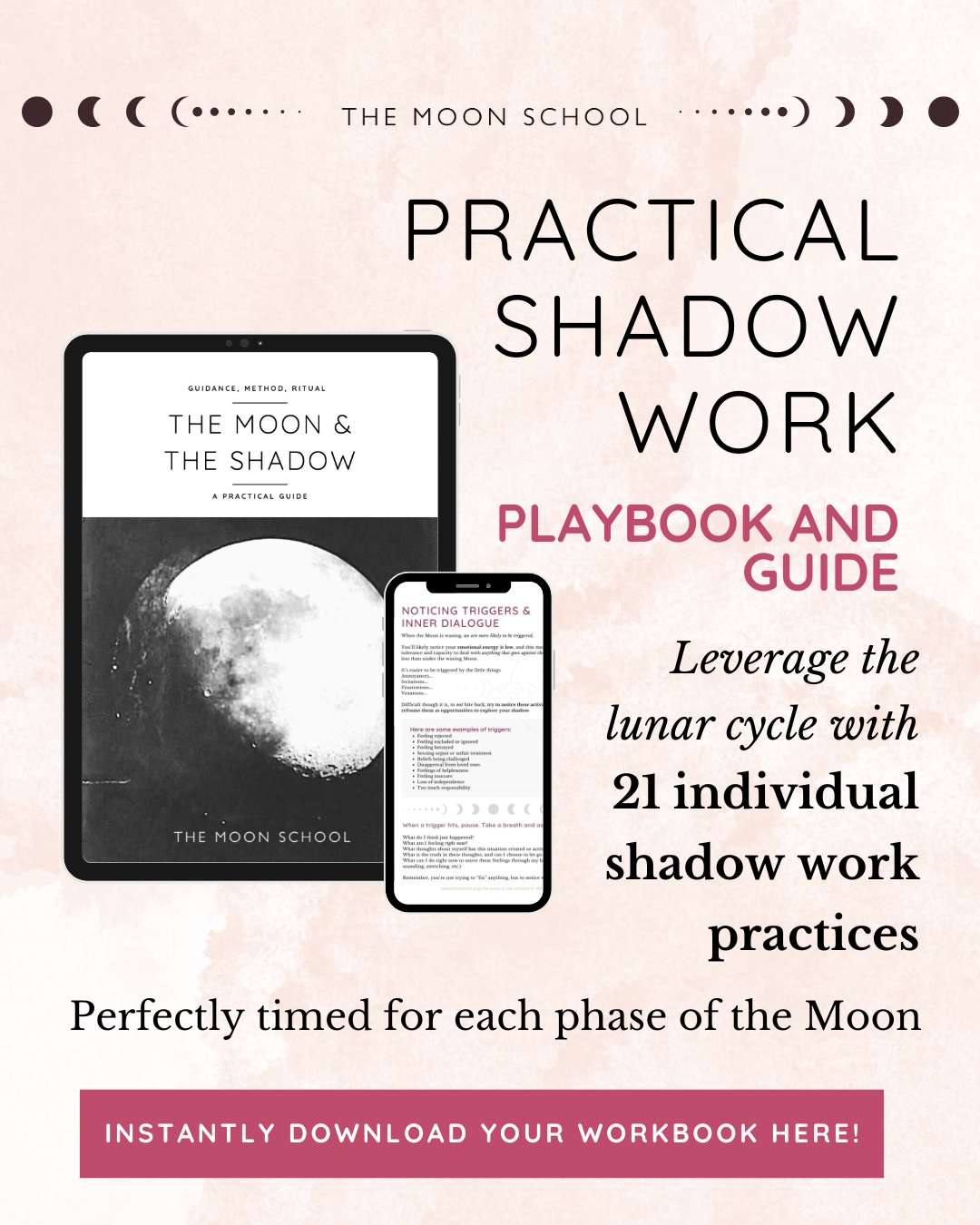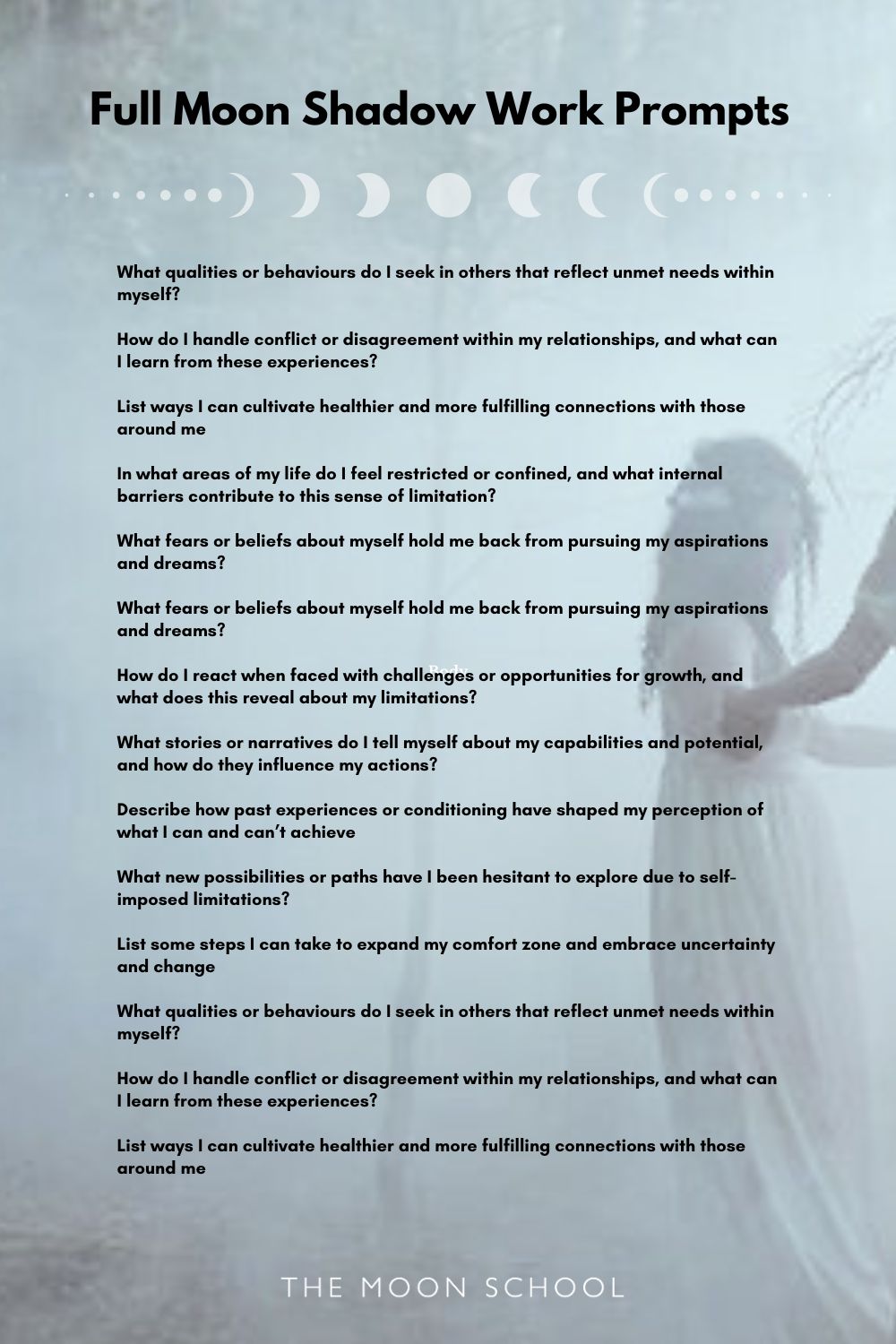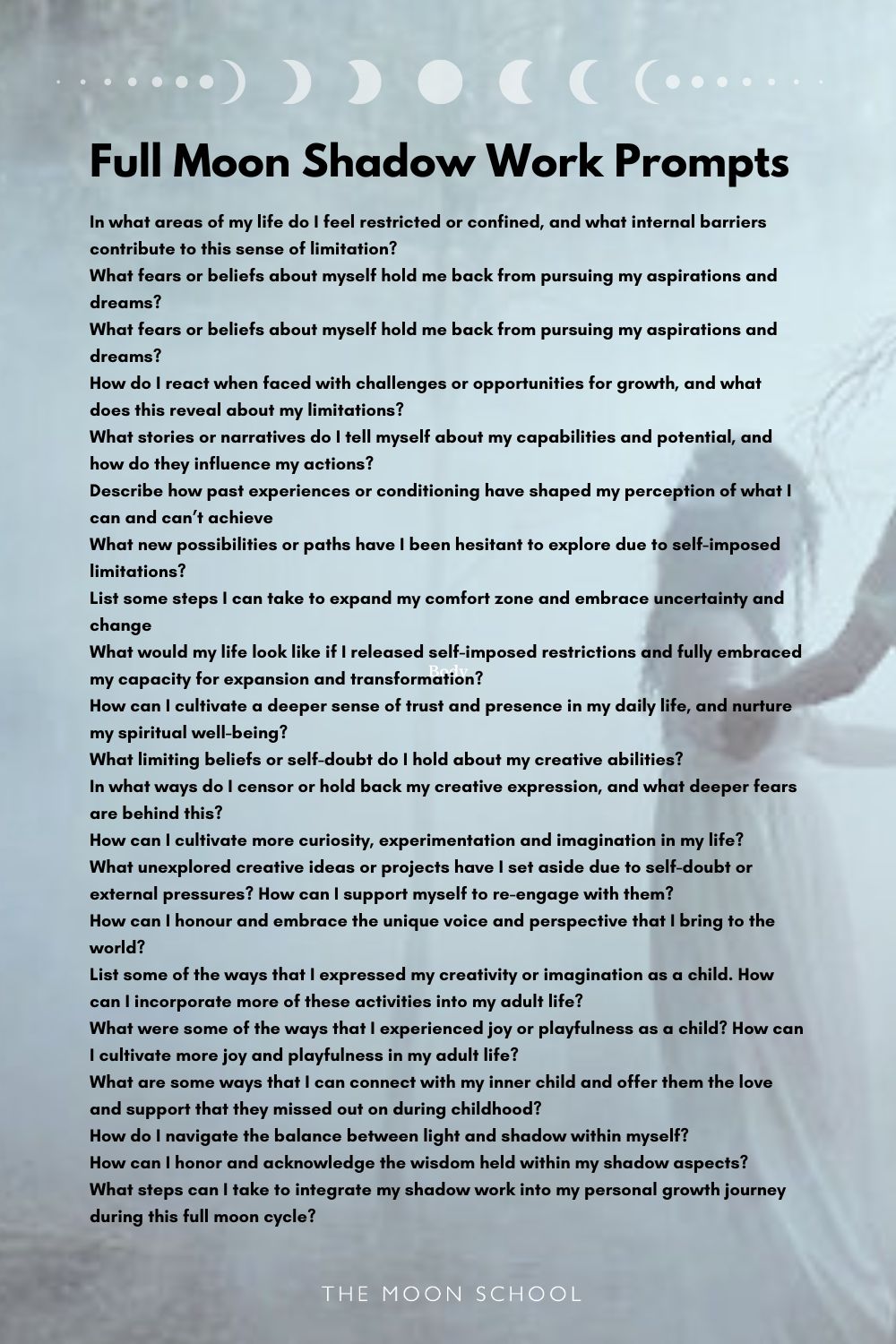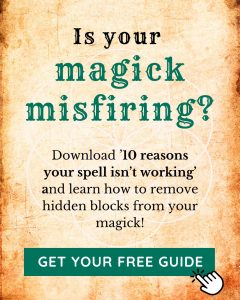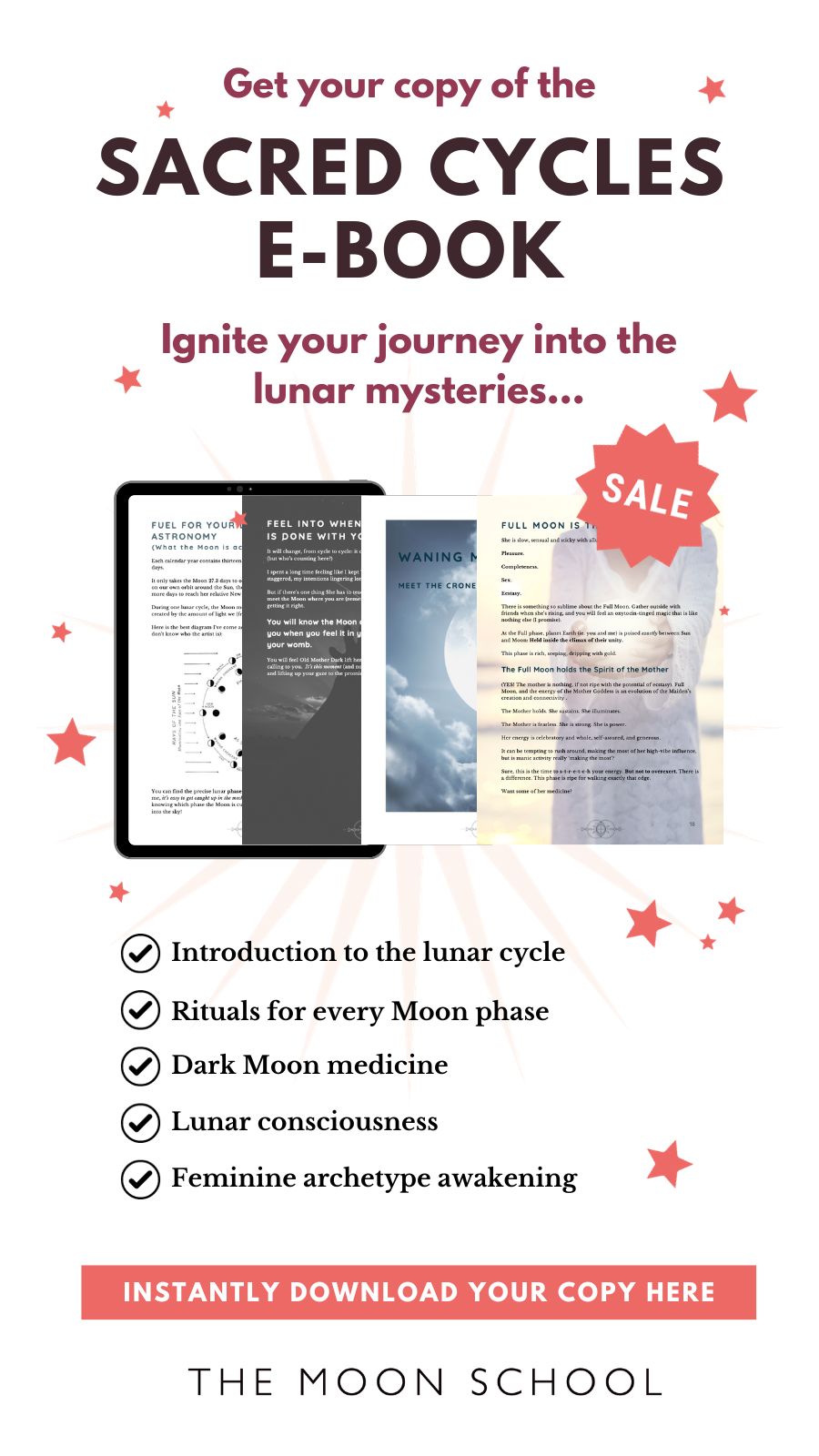Doing your shadow work during the full Moon phase of the lunar cycle can be profoundly significant on your journey of self-discovery and personal growth.
As the Moon reaches full luminosity, it doesn’t only illuminate the night sky, but also the depths of our inner selves, casting light upon the aspects of our personality and emotions that often remain hidden.
In this article, we will delve into the concept of shadow work, and elaborate on the beneficial role the full Moon can play, when you practice shadow work.
Because it’s a match made in heaven! By understanding the connection you’ll be able to harness this potent celestial energy when moving forward on your own path of self-exploration and healing.
What is shadow work?
Shadow work is a process that involves exploring the unconscious to discover hidden aspects of the psyche that have been rejected and repressed by the conscious mind.
Contrary to what many people think when they first come to shadow work, it’s not about “getting rid of”your darker aspects or healing them into submission, so they’re no longer there.
Shadow work is to fully explore, accept, and integrate our shadow selves so that we can become whole humans. Shadow work is the work of reuniting the seen and unseen parts of self, welcoming the darkness AND the light back into full consciousness.
How to identify your shadow self
When you begin doing shadow work, the first step is to identify your shadow self, and the hidden aspects it contains.
During the full Moon, it can be easier to see your shadow because of the added emotional and spiritual illumination that this bright Moon phase offers.
Some common shadow aspects might be feelings of shame, guilt, envy or anger. Or “personality traits” like assertiveness, neediness, being “too loud”, or “too” anything else.
To begin tracking parts of your shadow, notice when you are triggered into an intense or uncomfortable emotional reaction.
This can actually be really tricky because so often, of our hidden parts stay hidden from us! So they emerge unconsciously, without us noticing or in unexpected ways. This is what makes journaling such an effective tool when it comes to identifying these “dark side” parts of ourselves. Through writing in response to specific prompts, the true self can emerge.
But it’s really important to infuse the whole process of journaling with self-compassion and kindness and absolutely zero judgment for your tender parts.
Also read: 6 Simple Ways to Identify Your Shadow Traits
Using full Moon journal prompts for shadow work
Using journal prompts for your shadow work can be an extremely powerful way of firstly identifying your shadow self, and secondly, working to understand, heal and integrate it.
Most of the time, we’re blind to our own shadow, so it’s difficult to do this work without some kind of outside influence, guiding the inner work for us. Journal prompts serve as guiding beacons, directing our attention to the unexplored territories of our emotions, thoughts, and behaviours… Places we’d probably avoid otherwise.
When you practice shadow work at the full Moon – when the lunar energy is at its peak – you’re likely to be even more open to profound levels of introspection and self-discovery. This openness will facilitate more honesty and depth as you explore your inner world and enter into an inner dialogue with your hidden self.
Journaling during the full Moon may also allow you to harness its transformative energy, facilitating a deeper understanding of your shadow self and paving the way for personal growth and healing. As the Moon moves into the waning half of the cycle, you will be able to release what no longer serves you, letting go of any outmoded beliefs, habits and patterns you discovered through this process.
Another great thing about using journaling prompts is that you can be self-led and you can go at your own pace.
You may also like to return to the same prompts during subsequent full Moon phases, to see how your inner landscape is changing over time. This can be SO illuminating, and even form part of any full Moon ritual practice you already have.
OK. Let’s get to the writing prompts…!
50 Full Moon shadow work journaling prompts
What parts of myself do I typically keep hidden from others? What strategies do I have, to stop people from discovering those parts of myself?
How do I typically react when confronted with my own flaws or shortcomings?
How do I treat myself when I make a mistake? Do I beat myself up or do I show myself compassion and forgiveness?
What traits or behaviours do I tend to suppress in order to fit societal expectations?
What is my worst trait? Why is this so bad?
In what ways do I judge or criticize myself for not meeting internalized standards of perfection?
What parts of myself do I fear others may reject or disapprove of, if revealed?
How do I mask or hide certain aspects of my personality in different social contexts?
List some of the childhood experiences or societal influences have contributed to my self-censorship
List 5 emotions that I try to avoid? Why am I afraid to feel them?
What does my inner critic sound like? List some examples of how it has influenced my thoughts and actions
In what ways do I self-sabotage or hold myself back from reaching my full potential? How can I offer love to my self sabotaging urges and behaviours?
How have I internalized societal or cultural ideals that conflict with my authentic self?
How can I show more compassion and understanding towards the authentic parts of myself that I have abandoned?
What are some things that I love about myself? Why are these qualities important to me?
What are some things that I don’t love about myself? Why do I struggle to accept these qualities?
What are some past experiences that have affected my self-love? How can I heal from these experiences?
Who or what am I holding onto resentment or anger towards? Are there any people in my life that I need to forgive?
List the ways that holding onto past hurts or grudges may affect my emotional well-being
In what ways have I been resistant to forgiving myself for past mistakes or shortcomings?
What steps can I take to release the emotional burdens I am carrying?
How can I integrate the practice of forgiveness into my daily life to foster greater emotional freedom and resilience?
What recurring patterns or dynamics do I notice in my past and present relationships?
How do my early experiences with caregivers influence my current approach to relationships?
What fears or insecurities do I carry into my relationships, and how do they manifest?
In what ways do I prioritize the needs of others over my own in relationships?
How do I communicate my boundaries and needs within my relationships, and where do I struggle?
What qualities or behaviours do I seek in others that reflect unmet needs within myself?
How do I handle conflict or disagreement within my relationships, and what can I learn from these experiences?
List ways I can cultivate healthier and more fulfilling connections with those around me
In what areas of my life do I feel restricted or confined, and what internal barriers contribute to this sense of limitation?
What fears or beliefs about myself hold me back from pursuing my aspirations and dreams?
How do I react when faced with challenges or opportunities for growth, and what does this reveal about my limitations?
What stories or narratives do I tell myself about my capabilities and potential, and how do they influence my actions?
Describe how past experiences or conditioning have shaped my perception of what I can and can’t achieve
What new possibilities or paths have I been hesitant to explore due to self-imposed limitations?
List some steps I can take to expand my comfort zone and embrace uncertainty and change
What would my life look like if I released self-imposed restrictions and fully embraced my capacity for expansion and transformation?
How can I cultivate a deeper sense of trust and presence in my daily life, and nurture my spiritual well-being?
What limiting beliefs or self-doubt do I hold about my creative abilities?
In what ways do I censor or hold back my creative expression, and what deeper fears are behind this?
How can I cultivate more curiosity, experimentation and imagination in my life?
What unexplored creative ideas or projects have I set aside due to self-doubt or external pressures? How can I support myself to re-engage with them?
How can I honour and embrace the unique voice and perspective that I bring to the world?
List some of the ways that I expressed my creativity or imagination as a child. How can I incorporate more of these activities into my adult life?
What were some of the ways that I experienced joy or playfulness as a child? How can I cultivate more joy and playfulness in my adult life?
What are some ways that I can connect with my inner child and offer them the love and support that they missed out on during childhood?
How do I navigate the balance between light and shadow within myself?
How can I honor and acknowledge the wisdom held within my shadow aspects?
What steps can I take to integrate my shadow work into my personal growth journey during this full moon cycle?
What is the best Moon phase to do shadow work?
All phases of the lunar cycle are great for doing shadow work! Yet they offer certain energies, which can be harnessed for support, depending on what you need:
New Moon shadow work
During the New moon, set an intention for the area of life you want to dive into and heal, over the next lunar cycle. Create a Moon ritual to welcome in the new beginnings of your shadow work journey.
Waxing crescent shadow work
Under the waxing crescent Moon, work with shadow work practices to halp your best version emerge. What gold is lingering in the shadows of your unconscious?
Next read: What is the Golden Shadow?
First quarter shadow work
The First quarter Moon can offer up incredible opportunties to work with resistance, procrastination and limiting beliefs around what’s posisble for ourselves. Use shadow work techniques that focus on exploring confidence and self worth.
Waxing gibbous shadow work
Under the waxing gibbous Moon there’s a sense of “almost there” in the air, and we’re being called to dig deep. Whether you need to course correct, or employ stamina to keep going, shadows can rise which make us give up just before the finishing line. Use shadow work to look at any patterns of self sabotage, and how you may not feel safe receiving.
Full Moon shadow work
At the illuminating Full Moon phase, practice shadow work to explore the most deeply hidden parts of your psyche. Take time harnessing the light of the Moon with a full Moon ritual, and excavate your true nature.
Waning gibbous shadow work
The energy of the waning gibbous Moon supports scrutiny and fine attention to detail when doing your shadow work. Take a moment to review your journal notes from the full Moon, to glean extra insight. Be sure to avoid self criticism and stop any negative thoughts directed at yourself in their tracks.
Last quarter shadow work
Doing shadow work during the last quarter Moon can help interrupt negative patterns of behaviour that are rooted in old beliefs and conditioning. Pull your focus away from any external influence and use shadow work to explore the intimate spaces of your inner world. Your mindset now will form your future later.
Waning crescent shadow work
The waning crescent Moon phase is a powerful time to practice shadow work because feelings tend to bubble up strongly, and intuition is heightened. It’s time to trust the journey. Work to ensure you feel safe asn you release those things that no longer serve you and embrace the darkness of your true nature (which is a positive thing!)
Dark Moon shadow work
The dark Moon appears between one and three days before the new Moon, and is invisible. This mystical time of transformation can be one of the most potent for shadow work, as the deep darkness mirrors the darkness in out own lives, and teaches us how much richness can be found there.
GO carefully at this phase. Rest your body, mind, and soul and draw on the courage of the Dark Goddesses that reside here.

